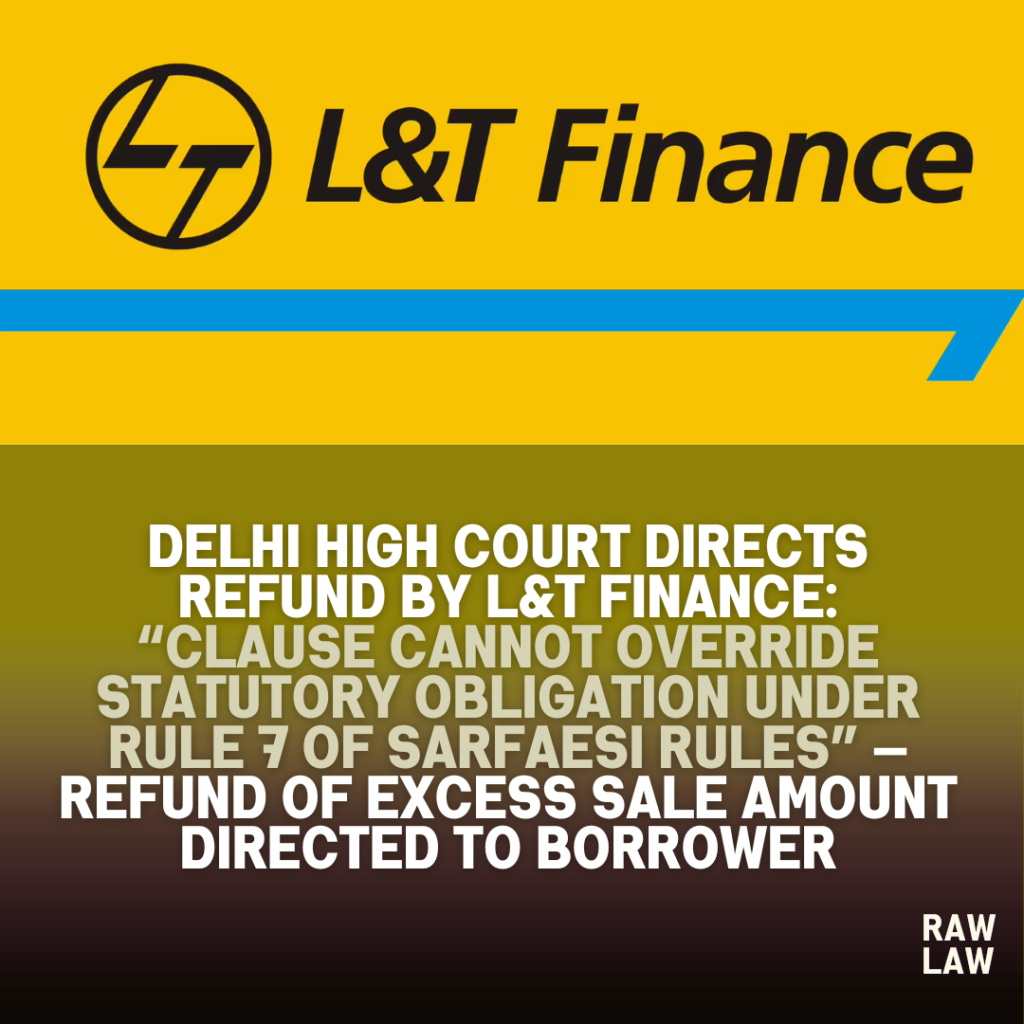Court’s Decision:
The Delhi High Court allowed the writ petition by the borrower and directed L&T Finance Ltd. to refund the surplus amount of ₹4,00,000, which was received from the auction sale of the borrower’s secured asset. The Court held that once the secured creditor recovers the outstanding dues, any surplus from the auction must be refunded to the borrower, irrespective of any clause in the loan agreement that purports to the contrary. The Court declared:
“A clause in the loan agreement cannot override the mandate of Rule 7(2) of the SARFAESI Rules, 2002.”
Facts:
The petitioner had availed a loan of ₹4,82,000 for purchasing a commercial vehicle from the respondent. The petitioner allegedly committed default, following which L&T Finance repossessed and auctioned the vehicle, recovering ₹6,60,000. The outstanding dues as per L&T Finance were only ₹2,60,000, and yet no refund was made of the remaining ₹4,00,000, despite repeated demands by the petitioner. The petitioner approached the Delhi High Court seeking refund of the surplus amount along with interest.
The respondent contended that the petitioner was not entitled to any refund in light of Clause 13 of the Loan Agreement, which allowed the finance company to retain the entire sale proceeds in case of default.
Issues:
- Whether the secured creditor (L&T Finance) is entitled to retain the entire sale proceeds even after recovering the outstanding dues from the borrower.
- Whether Clause 13 of the loan agreement can override Rule 7(2) of the Security Interest (Enforcement) Rules, 2002.
- Whether the petitioner is entitled to a refund of ₹4,00,000 being the surplus after adjusting dues.
Petitioner’s Arguments:
The petitioner argued that under Rule 7(2) of the Security Interest (Enforcement) Rules, 2002, the secured creditor must refund the surplus amount received from the auction after satisfying the dues. The borrower contended that no amount remained due post-auction, and the finance company was wrongfully withholding the excess. It was also argued that a contractual clause (Clause 13) that permits such unjust enrichment violates public policy and the statutory mandate.
Respondent’s Arguments:
The respondent (L&T Finance) submitted that Clause 13 of the loan agreement provided that upon default and repossession, the borrower would not be entitled to any surplus from the sale of the repossessed vehicle. It was also contended that by signing the loan agreement, the borrower had waived any right to claim the surplus, and the finance company was entitled to retain the entire amount as per contract.
Analysis of the Law:
The Court relied heavily on Rule 7(2) of the Security Interest (Enforcement) Rules, 2002, which states:
“Any surplus of money realized from sale of secured assets shall be paid to the person entitled thereto.”
The Court held that this rule is statutory in nature and prevails over any contractual clause that seeks to defeat it. It reiterated that no clause in a loan agreement can contravene the mandatory provisions of a statute, especially one intended to protect borrowers.
The Court also noted that retention of the excess amount after full satisfaction of debt amounts to unjust enrichment, which is impermissible under law.
Precedent Analysis:
The Court referred to the Supreme Court’s judgment in ICICI Bank Ltd. v. APS Star Industries Ltd. (2010) 10 SCC 1, which held that statutory obligations under the SARFAESI Act and Rules prevail over contractual clauses, especially when the clauses violate public policy or result in unjust enrichment.
It also considered State Bank of India v. Mula Sahakari Sakhar Karkhana Ltd., where the Court emphasized that surplus amounts from sale must be returned to the borrower, and the secured creditor cannot retain any excess amount beyond its dues.
Court’s Reasoning:
The Court decisively rejected the respondent’s reliance on Clause 13, terming it as contrary to the statutory obligation cast upon secured creditors under Rule 7(2). It observed:
“A borrower, even if declared a defaulter, continues to have a right to receive the surplus proceeds from sale of the secured asset. The contract cannot divest him of this statutory entitlement.”
The Court emphasized that the SARFAESI Rules are enacted to ensure transparency and fairness in the process of enforcement of security interest, and a lender cannot bypass this framework through one-sided contractual stipulations.
Conclusion:
The Delhi High Court directed L&T Finance Ltd. to refund ₹4,00,000 to the petitioner within four weeks, failing which the amount would carry interest @ 6% p.a. from the date of this judgment until realization.
“A secured creditor cannot enrich itself at the cost of the borrower by invoking contractual clauses which militate against statutory provisions.”
Implications:
- This ruling reaffirms that contractual clauses in loan agreements must conform to statutory mandates.
- It sets a precedent that surplus proceeds from auction sales must be refunded, irrespective of terms in the loan agreement.
- It safeguards borrowers from unjust enrichment by financiers, particularly non-banking financial institutions, who often insert one-sided clauses.
Judgments Referred:
- ICICI Bank Ltd. v. APS Star Industries Ltd. (2010) 10 SCC 1
- Emphasized that SARFAESI obligations prevail over contractual terms.
- State Bank of India v. Mula Sahakari Sakhar Karkhana Ltd.
- Reiterated that excess sale proceeds must be refunded to the borrower.
FAQs:
1. Can a loan agreement clause override SARFAESI Rules?
No. The Delhi High Court held that a clause in a loan agreement cannot override statutory provisions like Rule 7(2) of the SARFAESI Rules, 2002.
2. Is the borrower entitled to refund of surplus even if he defaulted?
Yes. The borrower is entitled to the refund of any amount remaining after the lender recovers the outstanding dues from the sale of the secured asset.
3. What happens if the secured creditor retains the surplus amount?
Retention of surplus amounts after full recovery of dues amounts to unjust enrichment and is liable to be refunded, along with interest if not paid in time.
